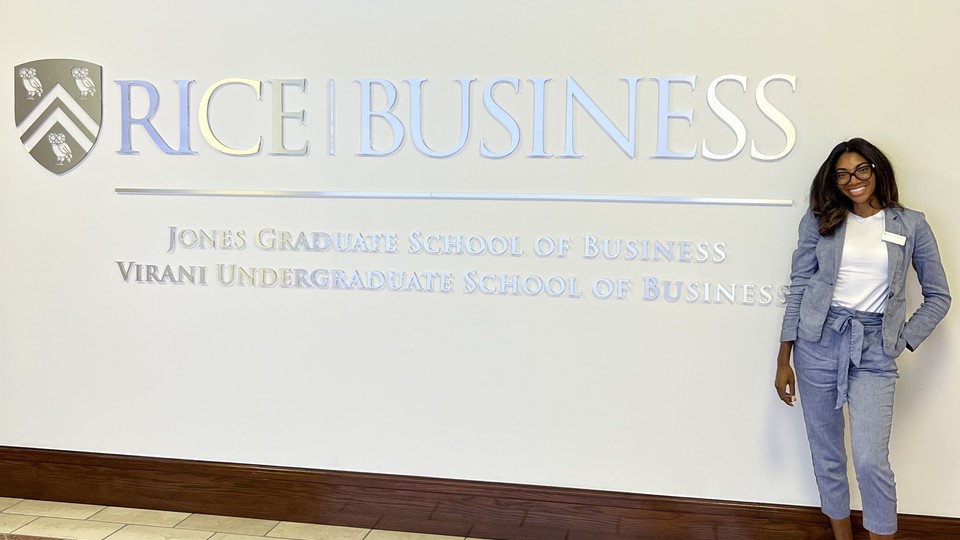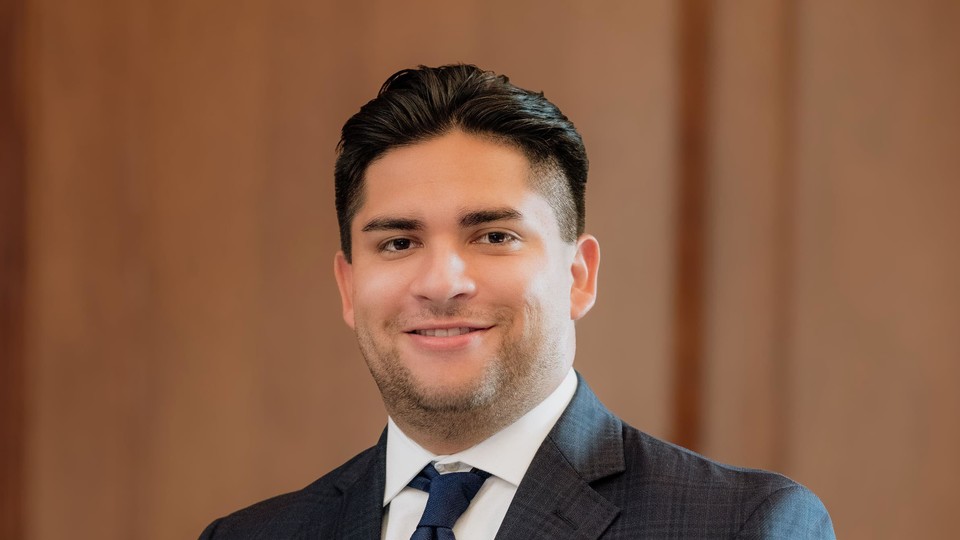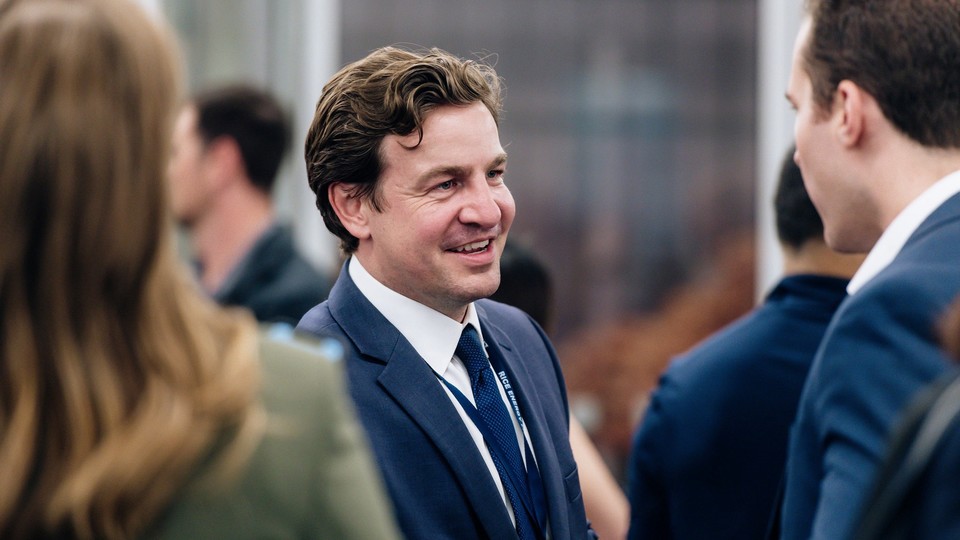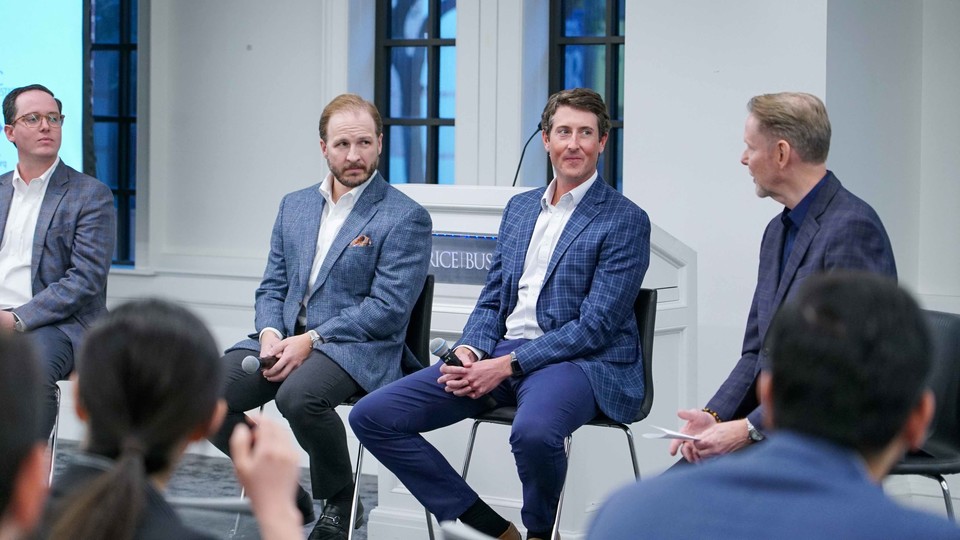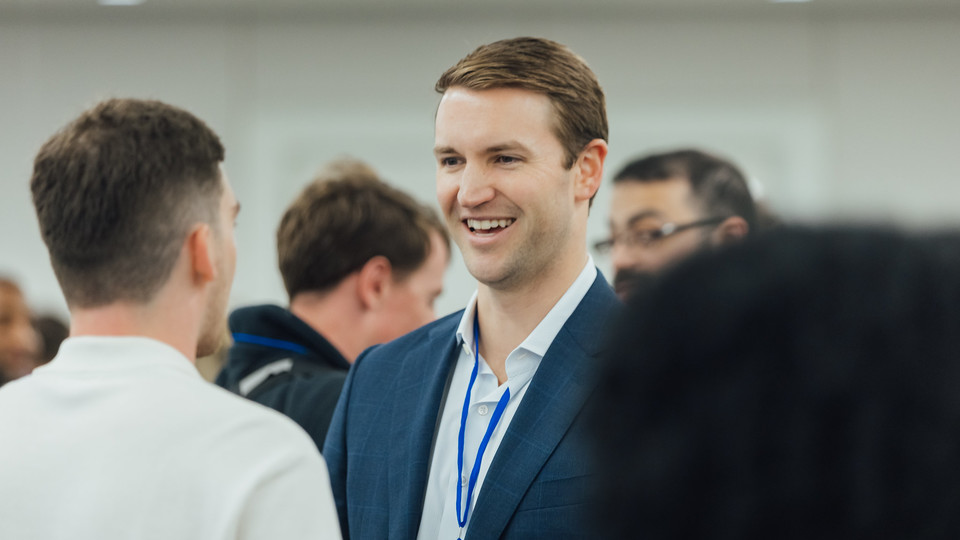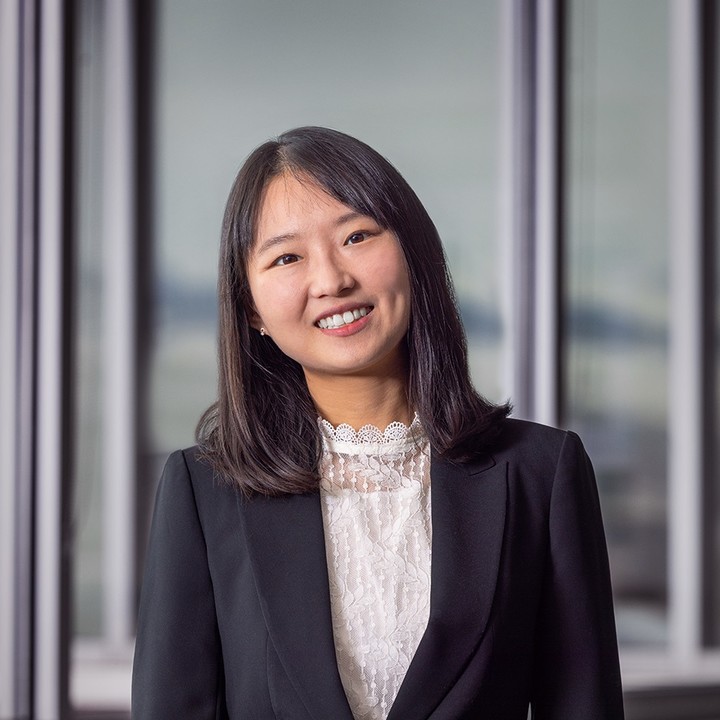The Sweet Taste of Success
Opeyemi “Ope” Amosu ’14 grew ChòpnBlọk from pop-ups to a nationally acclaimed Houston restaurant, merging West African cuisine with business expertise and earning James Beard Award recognition.
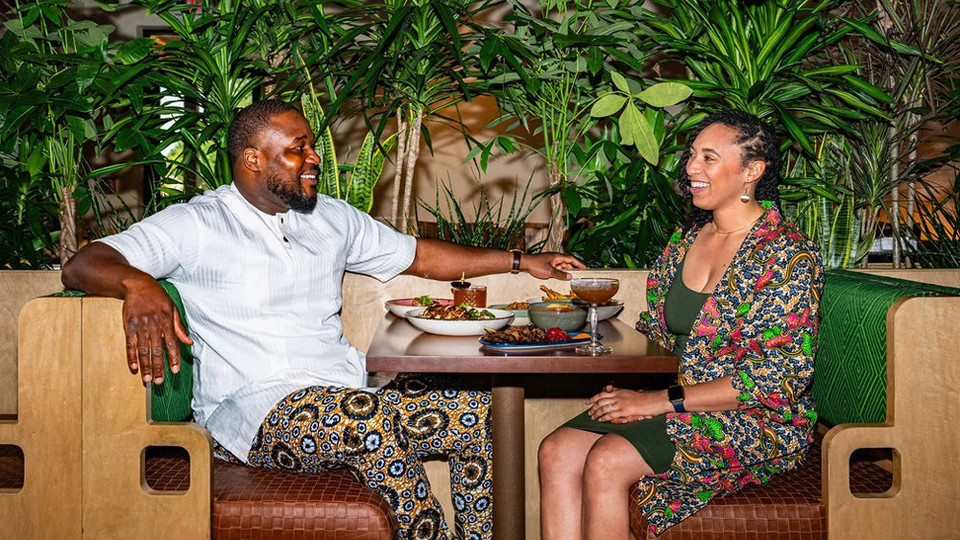
When Opportunity Meets Preparation: Meet Kunal Chopra
Meet Kunal Chopra '27, energy professional and MBA student at Rice Business.
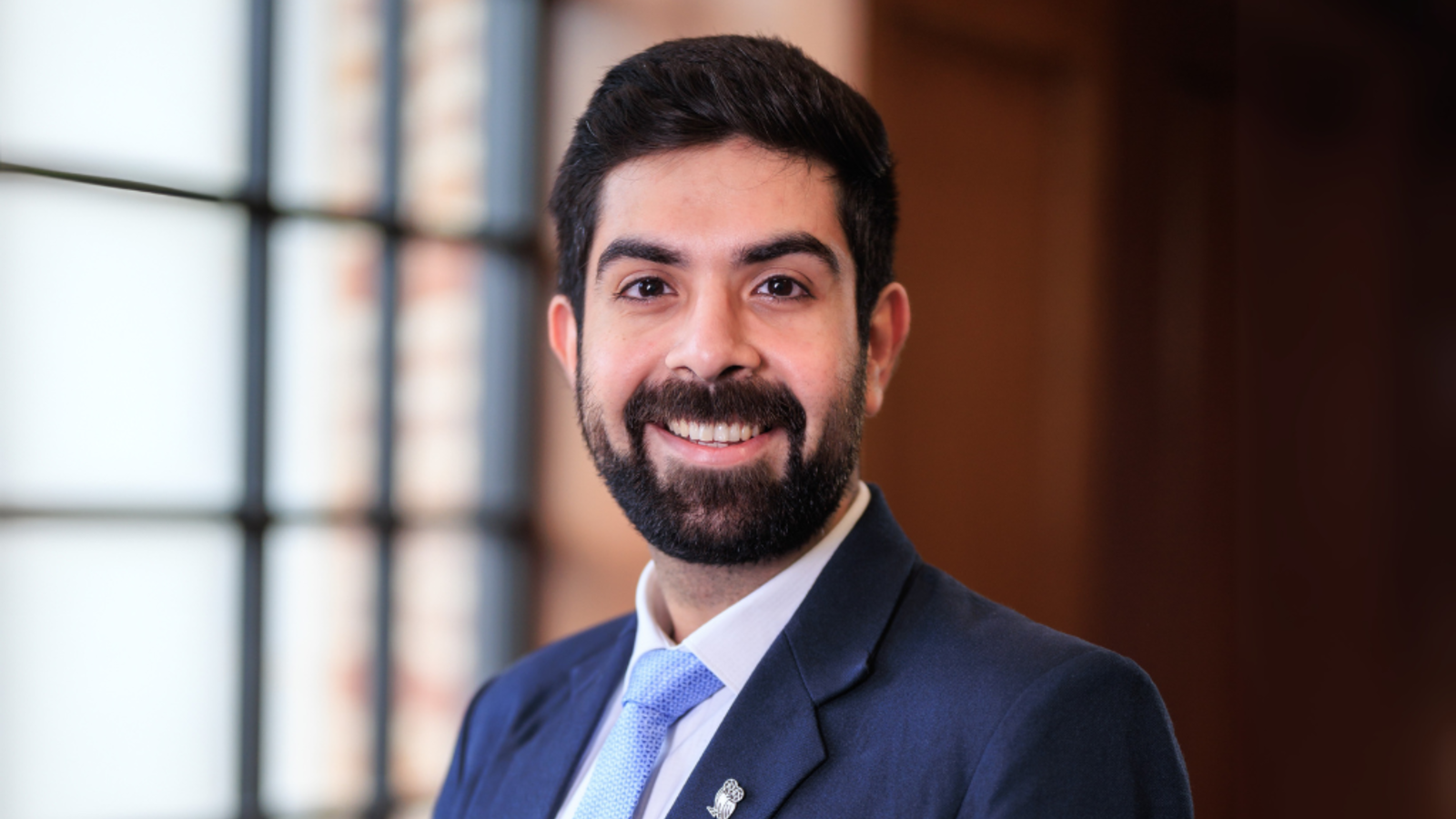
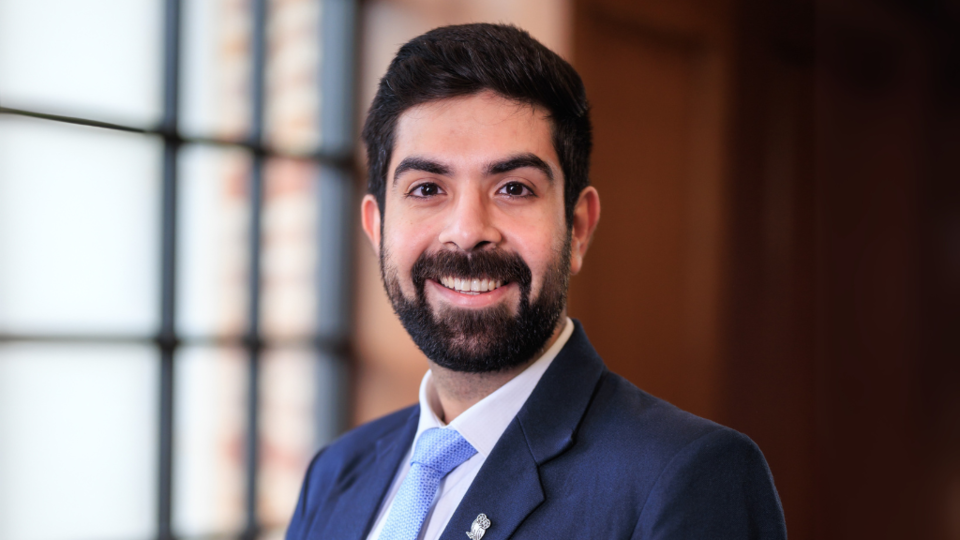
From Bangalore, India, to Houston, Texas, Kunal Chopra has powered a successful career in oil and gas. Now, he’s beginning a new chapter at Rice Business as a student in the PMBA Class of 2027. Continue reading Kunal’s profile to learn more about his journey to Rice and how Launch Week has made him feel at home.
Tell us a little about your career and background.
Education: Mechanical engineering, Delhi Technological University, India
Most Recent Employer and Job Title: ExxonMobil, Guyana Venture Project Controls Lead
Career Highlights and Industry Experience: I’ve worked with ExxonMobil for seven years and have experience as a project data engineer, market analyst, commercial and technical modeler, and project controls engineer in the oil and gas industry.
I began my career in Bangalore, India, before moving to the U.S. to support the LaBarge Carbon Capture Project as a Project Controls Engineer. Earlier this year, I got the opportunity to step into a leadership role as a supervisor and relocated to Houston to work on the Guyana Venture – Deepwater Projects.
What is a fun fact about you?
I enjoy reading comic books! I’ve been a Marvel fan since my childhood and follow the movies as well.
Why did you choose Rice Business?
I knew about the Rice University prestige and reputation, and the school is right in the center of the energy capital. The Rice MBA offers a diverse cohort of people from multiple organizations and industries, which invites various perspectives to classroom discussions. I’m looking forward to the on-campus, in-person classes, as well as the many opportunities to network.
Why did you choose our Professional MBA program?
The idea of going back to school to pursue an MBA had always been on my mind, but taking a break from work wasn’t an option. But the Professional MBA program gives me the flexibility to pursue my education alongside my work, and there are multiple electives offered in the program that translate very well to my industry and can enhance my work.
How are you feeling about starting your MBA? What are you most looking forward to?
I am super excited to start the MBA journey! I’m looking forward to gaining new knowledge from this program and leveraging that to both accelerate my career and develop as a reliable leader. I am a firm believer in luck, for “Luck is when an opportunity meets your preparation.” In short, I am preparing myself for the next big opportunity that shows up at my doorstep!
How was your experience during launch week? What were your first impressions of the program and your classmates?
Launch Week was a sneak peek into what to expect over the course of the MBA program. Switching back into “student mode” is not easy, so Launch Week served as a boot camp and helped jumpstart the process for me. During the Competitive Strategy class, our group was required to evaluate a case study and present our findings. To make the presentation interesting, the five of us ended up creating a Shark Tank skit. It was a lot of fun!
One word for my classmates: Awesome! Everyone has a story to tell, and it’s interesting to hear about how they got to where they are. All of us started from different places, jobs and education backgrounds — and now chose to open this chapter at Rice together.
Kunal Chopra is a Professional MBA student in the Class of 2027.
The Rice MBA
No credit history? No problem − new research suggests shopping data works as a proxy for creditworthiness
New research from Rice Business Professor Jung Youn Lee finds that grocery purchasing data could predict credit risk as reliably as traditional credit scores — helping banks identify trustworthy borrowers and expand access to credit.
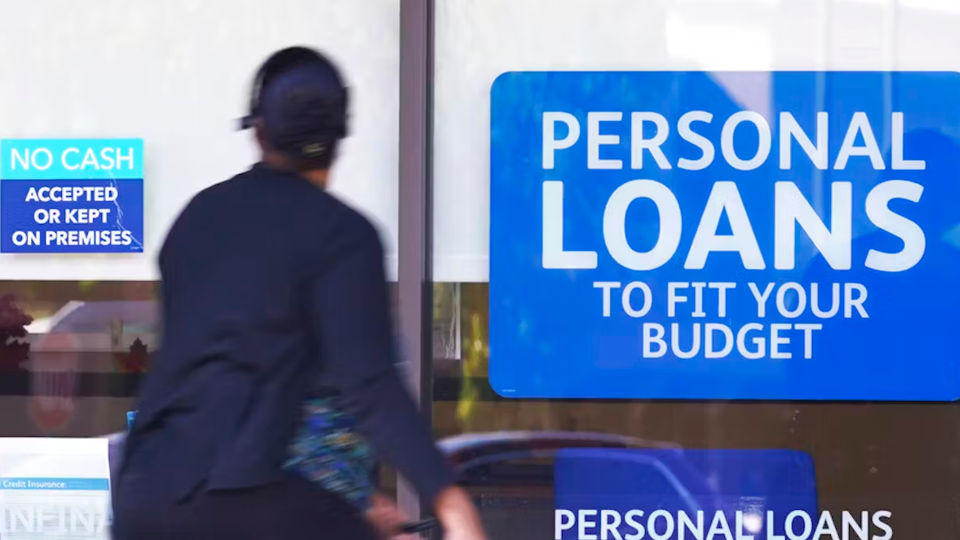
What MBA Recruiters Are Looking for in 2025
Wondering what it takes to stand out to MBA recruiters in 2025? From networking early to showing curiosity, professionalism and a clear sense of direction, recruiters share candid advice with MBA students at Rice Business.
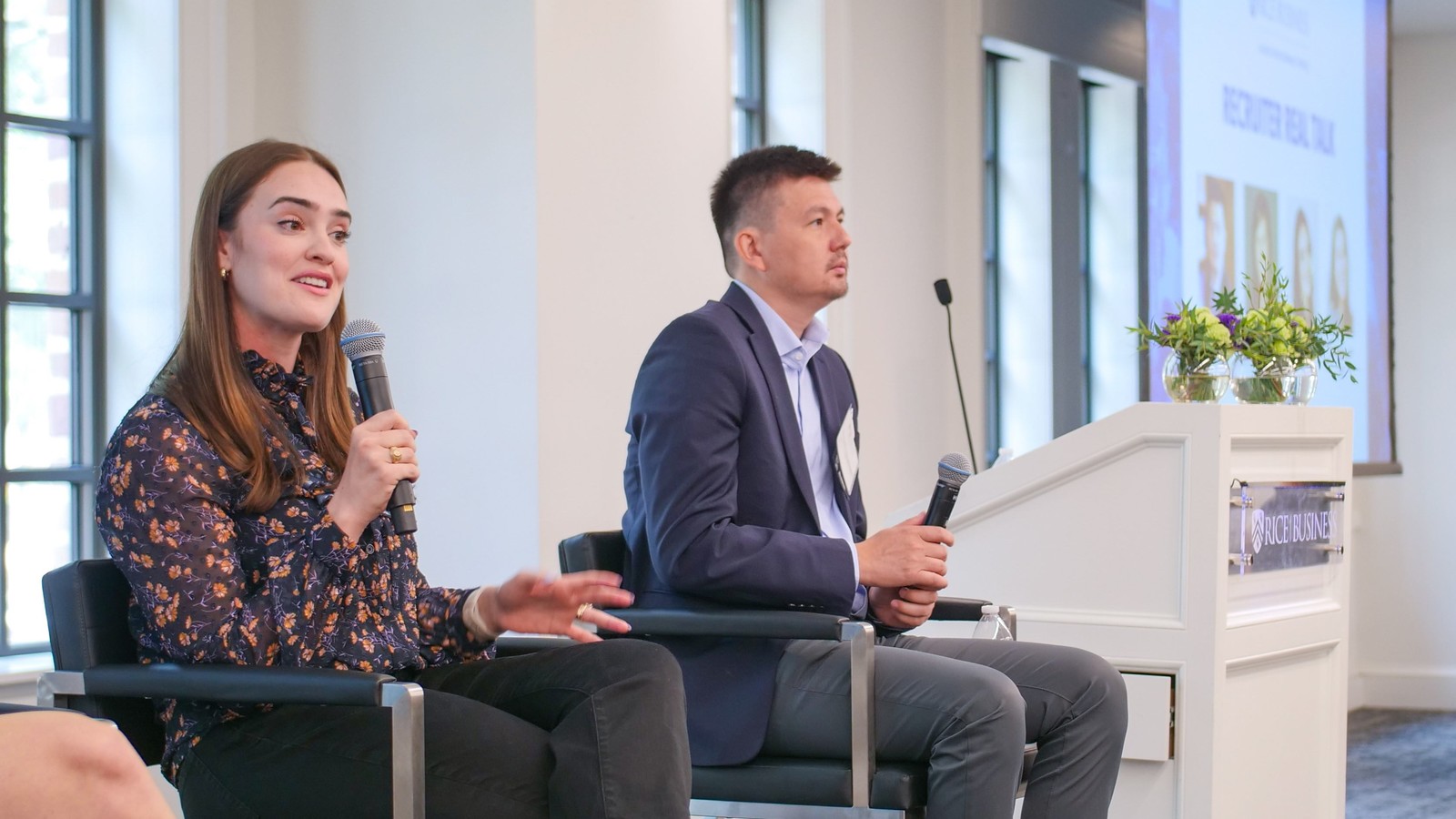
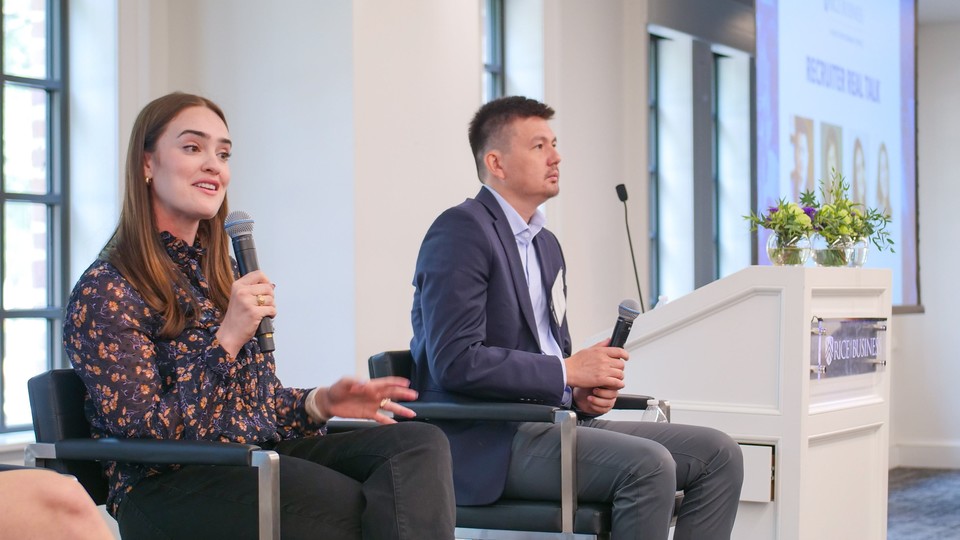
MBA recruiting looks a little different every year, but the fundamentals never change: Employers want to hire motivated candidates who show curiosity, professionalism and a clear sense of direction.
At Rice Business, the Career Development Office (CDO), a key professional resource for MBAs looking to connect with employers and alumni, recently hosted an event called “Recruiter Real Talk” to share insider tips on today’s MBA job market. Recruiter panelists Dana Vasquez ’24, Katie Sanborn ’19, Madeleine Tunnard ’23 and Kuanysh Samigollayev ’23 offered candid advice on how students can navigate the recruiting journey with confidence.
1. Start Early
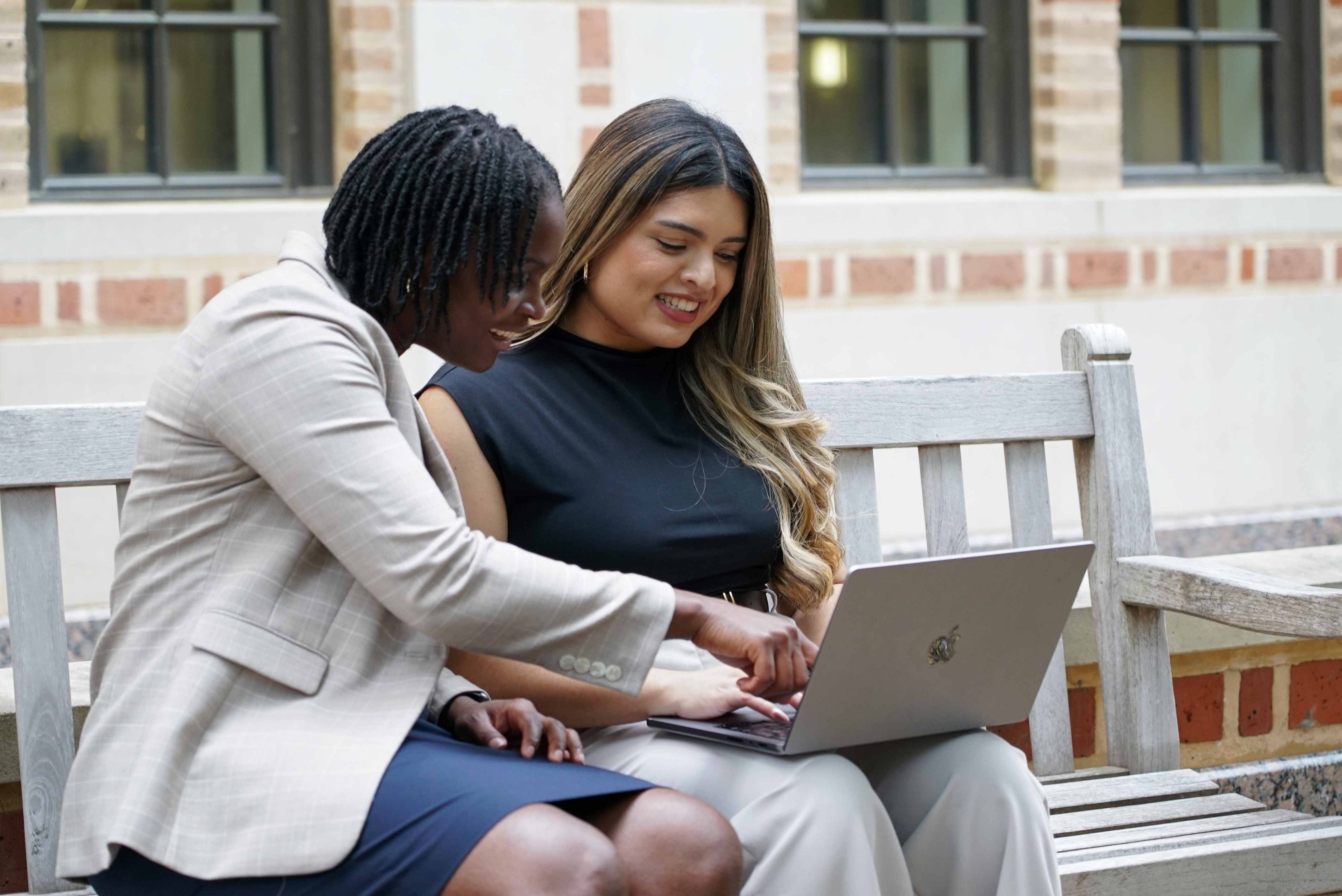
Recruiting timelines vary by industry. If you’re considering a role in a specific industry, like investment banking, begin preparing as soon as possible — even before the first day of your MBA program. Don’t wait until the first semester’s over in order to figure out if a field is for you. Begin attending information sessions, networking events and coffee chats immediately.
Why? Because timelines in some industries are accelerated, and opportunities can pass quickly. As one recruiter put it: “You can always step back later, but you can’t rewind the clock.”
In fact, the earlier you apply for the Rice MBA, the sooner you’ll unlock the opportunities, insights and connections with students and alumni to help you hit the ground running. And once you’re here, make sure to connect with second years — they’re your best advocates and most reliable guides across industries.
2. Treat Every Interaction Like an Interview
From the first handshake at a networking event to a quick exchange in McNair Hall, recruiters notice how you show up in every conversation, not just the formal recruiting events. That means:
- Dress appropriately, even for coffee chats.
- Be professional in your tone, whether by email or in person.
- Assume that everything you say will make its way back to the hiring team.
Katie Sanborn ’19 put it best: “Every interaction you have, consider it an interview.”
3. Referrals and Relationships Matter
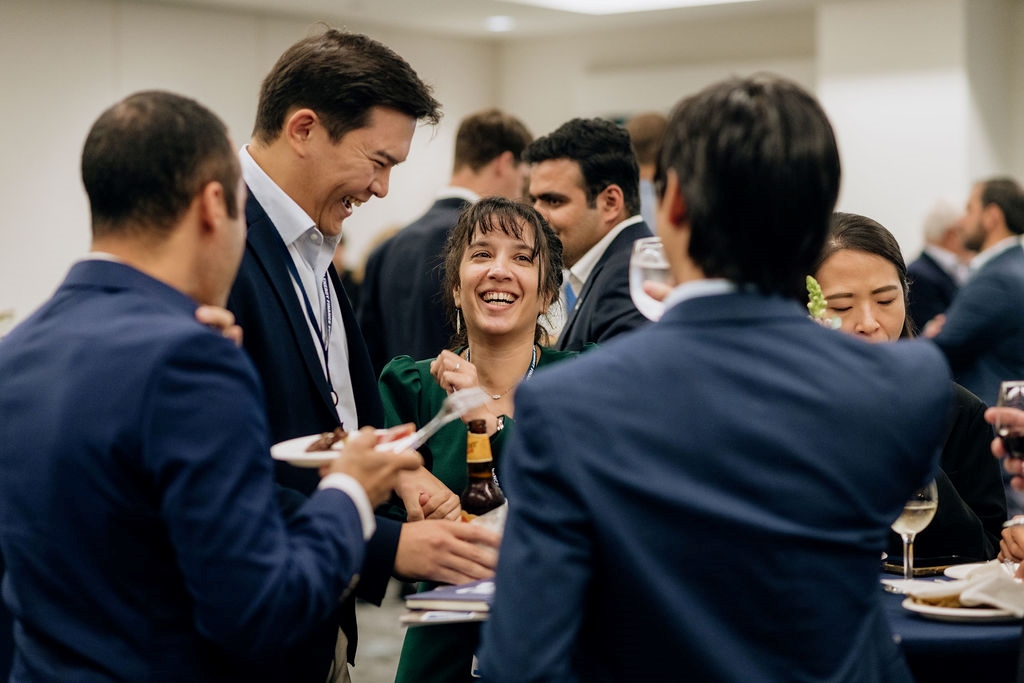
Recruiting isn’t a numbers game, so submitting 50 applications without meaningful connections won’t get you very far. But internal referrals, built on authentic conversations, can make all the difference. The strongest candidates:
- Build genuine relationships before asking for a referral.
- Come to coffee chats with specific questions.
- Follow up quickly and thoughtfully, showing you’ve learned something new.
Recruiters remember the students who make them feel like the conversation mattered.
4. Show Curiosity (And Attention To Detail)
No matter what industry you’re seeking your next role in, recruiters are looking for MBA students who are curious, adaptable and genuinely eager to learn.
Recruiters are also paying attention to the little things: Does your cover letter seem to be AI-automated or vague? Did you spell the company name correctly in your email? Did you address the recruiter properly? Typos, copy-paste errors, small mistakes and overgeneralizations can cost you an opportunity.
Pro tip: Set a short delay on your emails to give yourself time to catch errors before they send.
Interested in Rice Business?
5. Demonstrate Fit Over Time
In early coffee chats, recruiters don’t expect you to know everything about their company or the role. But as you progress, they do expect you to get more specific. Try to reference what you’ve learned about a company’s culture, values, team structures or projects over the course of recruitment.
That progression shows you’re learning, retaining information and building intentional relationships, which will help you stand out in today’s recruiting landscape.
6. Know Your Goals
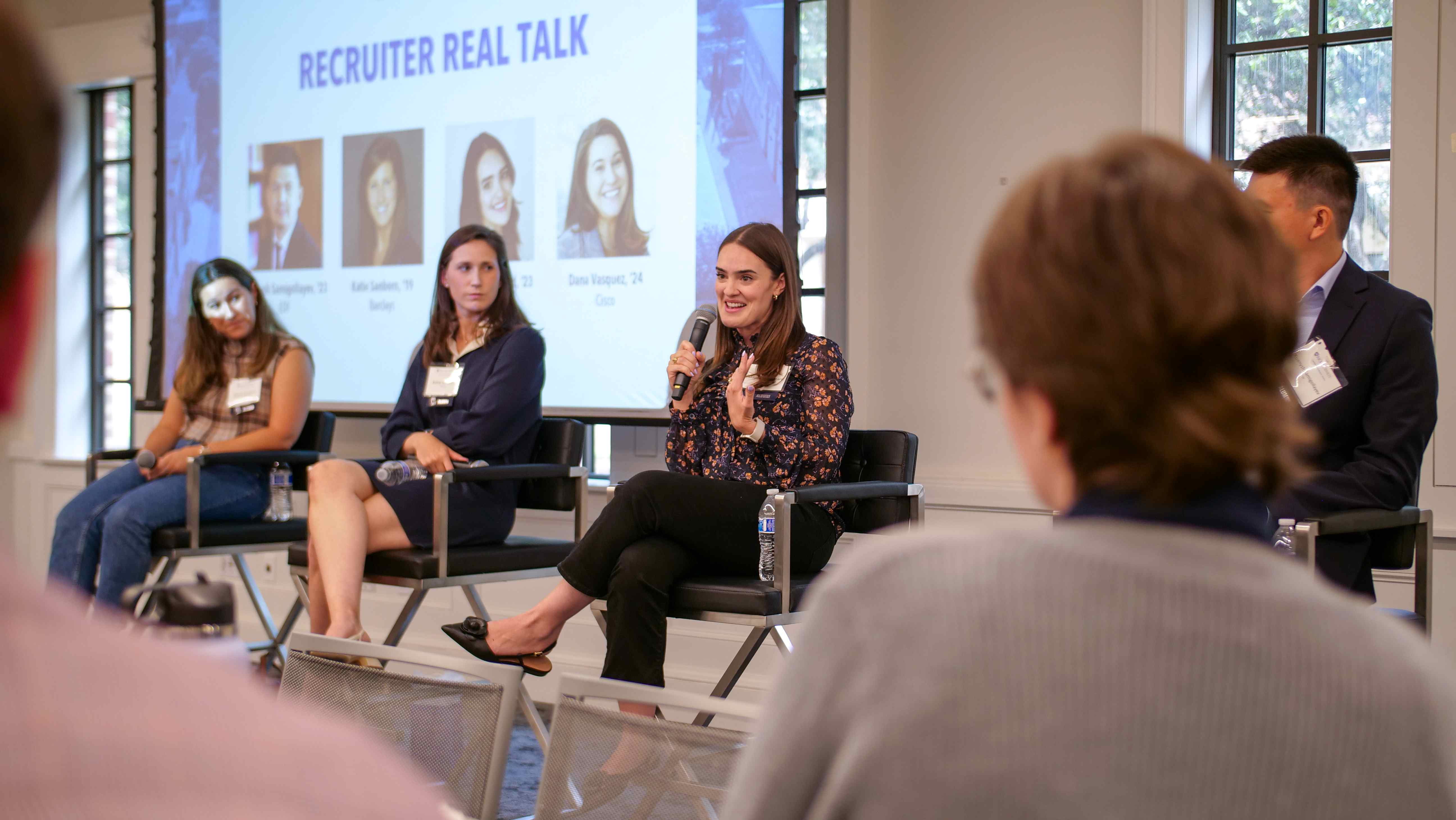
When weighing industries, roles or timelines, reflect on your priorities and non-negotiables by asking yourself questions like:
- What kind of lifestyle do I want?
- Where do I want to live?
- How much am I willing to travel or work each week?
If you’re pivoting or still deciding what field is for you, your time in the Rice MBA program is a unique opportunity to “test drive” different fields. One rule of thumb is to pay attention to what energizes you and what drains you.
7. Don’t Forget the Bigger Picture
Recruiting is important — but it’s not the only reason you’re here. Your two years at Rice Business are also about finding community, networking, and growing through clubs, conferences, labs and so much more.
The panelists reminded students to lift each other up during the recruitment process. It’s much easier to go through with support by your side, and there are plenty of opportunities to go around. But how you treat your classmates and peers will shape your reputation long after graduation.
Final Tip: Use Your Resources
The best news? You don’t have to figure this out alone. The CDO team is in constant conversation with employers and recruiters, so their guidance reflects what companies are actually looking for in candidates right now.
Just like the two-year MBA journey, recruitment will work best for you when you dedicate the time and efforts to it. Make the most of your time at Rice Business, foster strong relationships, use your resources — and you’ll be ready not just to land a job, but to launch a meaningful career.
You May Also Like
Keep Exploring
12+ can't-miss Houston business and innovation events for September
Hear from clean energy startups from nine countries and 19 states at the 22nd annual Energy Tech Venture Forum during Houston Energy & Climate Week, September 15-19.
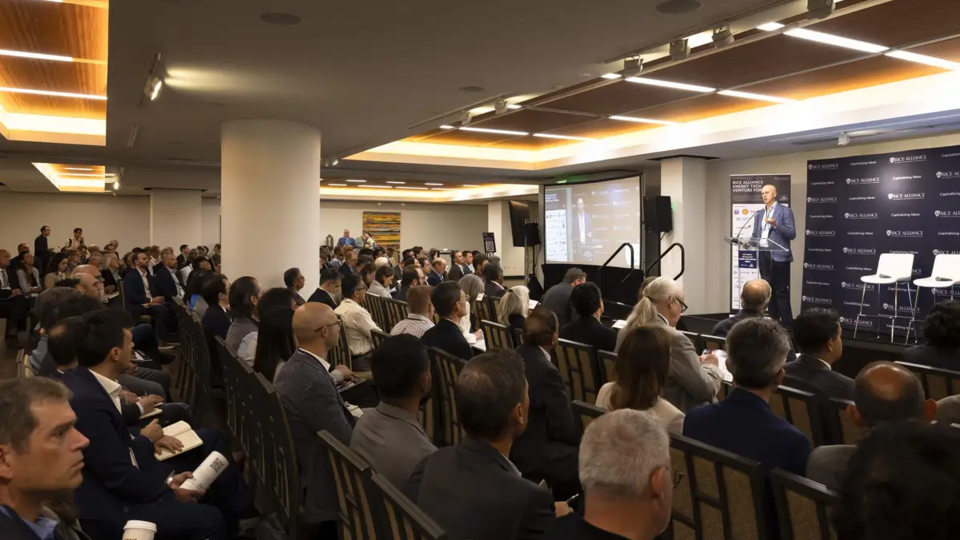
Do More With What You Have with Scott Sonenshein
In this episode of Work From The Inside Out, Rice Business professor and best-selling author Scott Sonnenschein shares his unconventional career journey and insights from his book Stretch: Unlock the Power of Less and Achieve More Than You Ever Imagined.
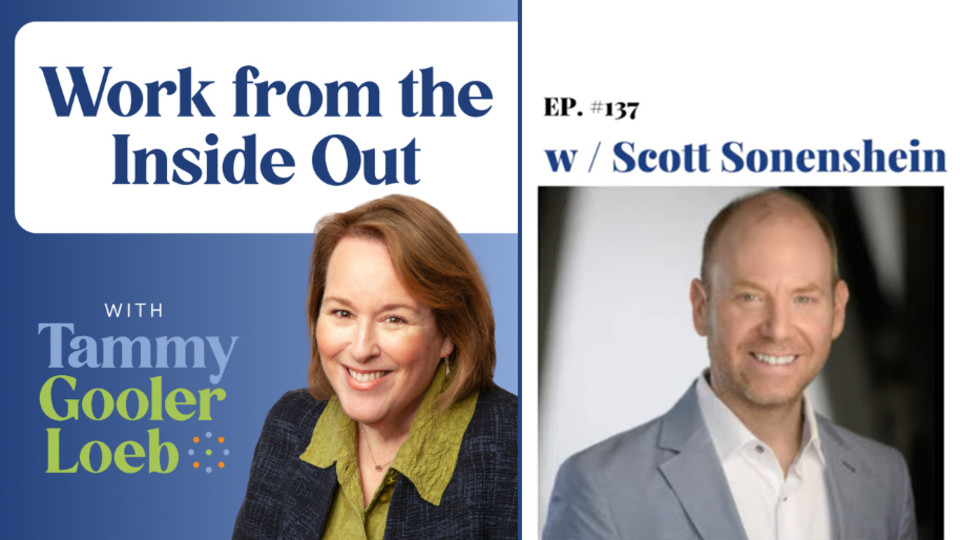
Excited for the Journey Ahead: Meet Ali Mroue
Ali Mroue shares his story and why he chose Rice’s Professional MBA program.

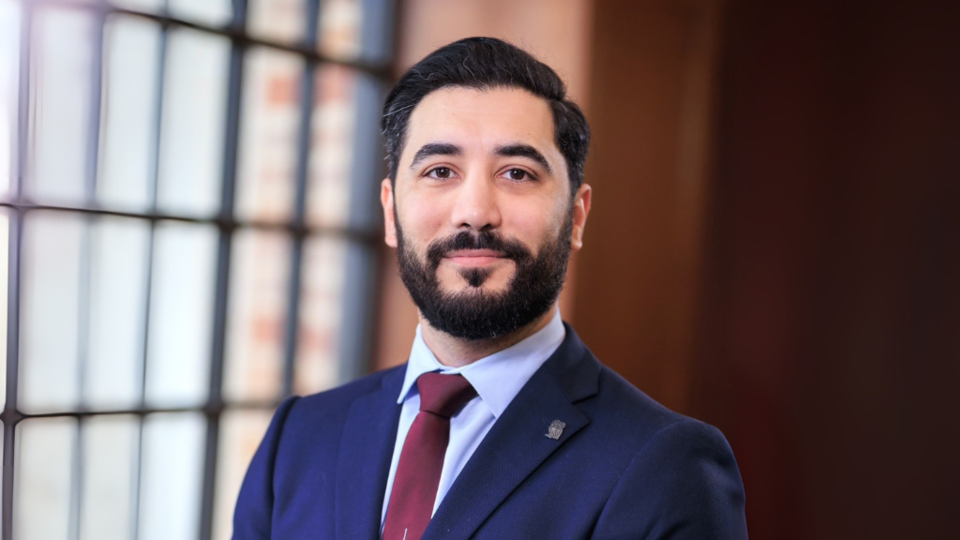
Meet Ali Mroue, PMBA Class of 2027! In this profile, Ali shares why he chose Rice, what drew him to the Professional MBA program and how Launch Week set the stage for his MBA journey.

Tell us a little about your career and background.
Education: Doctor of Pharmacy (PharmD), Lebanese American University
Most Recent Employer and Job Title: Marketing Manager at Eagle Analytical
Career Highlights and Industry Experience: Experienced in the world of pharmaceuticals and personalized medicine.
What is a fun fact about you?
I played college and semipro soccer growing up.
Why did you choose Rice Business?
The tight-knit community, diversity among the cohort and prestige that comes with it.
Why did you choose our Professional MBA program?

I chose the Professional MBA program because I wanted an in-class MBA experience that would allow me to actively engage with my peers, build meaningful connections and collaborate with professionals at a similar stage in their careers. I was also drawn to Rice’s vibrant campus and looked forward to spending more time immersed in its community throughout the program.
How are you feeling about starting your MBA? What are you most looking forward to?
Excited and ready for the journey ahead! I’m looking forward to gaining insights from both the classroom and my peers and using those experiences to shape the next chapter of my career.
How was your experience during launch week? What were your first impressions of the program and your classmates?
Launch Week was intense but incredibly rewarding — I truly hit the ground running. I’m confident I chose the program that’s the perfect fit for me, and I already feel a strong sense of belonging. My classmates are exceptional, each bringing unique experiences and perspectives. Rice has done an outstanding job creating a diverse and well-balanced cohort, and I’m excited for the opportunity to exchange knowledge, ideas and culture with one another throughout the program.
Ali Mroue is a Professional MBA student in the Class of 2027.
The Rice MBA
Loving Your Work Is Good. But It’s Not a Virtue.
Professor Mijeong Kwon’s research finds that loving your work can be valuable — but treating it as the only “right” reason to pursue a career can cause harm.
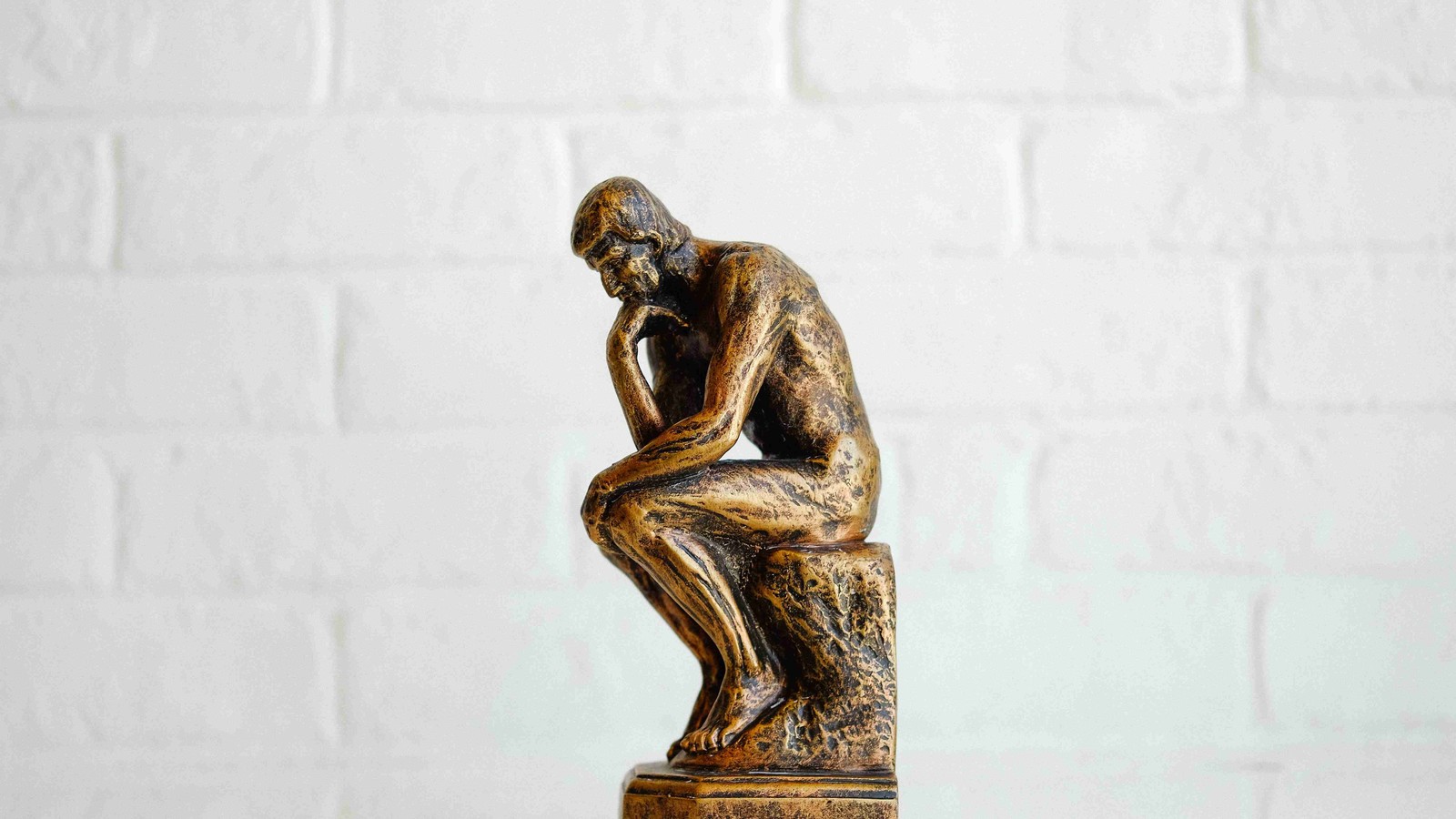
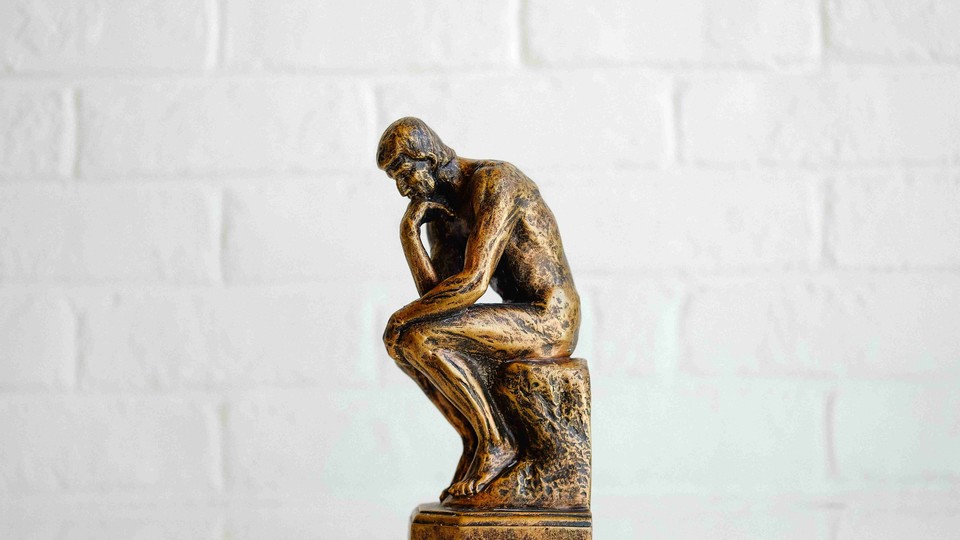
In this Q&A, assistant professor Mijeong Kwon explains why Americans moralize loving one’s work, how that expectation shapes careers and what she’s studying next.
The takeaway? Leaders should be mindful to not impose love of work as a standard, and employees should remember that all motives — from money to meaning — are legitimate.
Can you tell us about the main focus of your research?
Yes — so, my research focuses on a question we often get in our interviews and work conversations: “Why are you interested in this job?” or “Why do you do this work?” It’s a question of motivation. And we often have a hunch that there is a right answer for that question, but there’s surprisingly little research on this — how people perceive others’ work motivation.
Coming from an international background, especially, I thought that there’s really something interesting about “intrinsic motivation” in this country, about the social pressure to enjoy and love your work. We tend to admire people who love what they do, and we treat that love as a sign of character, not just preference.
So, my research is about what I call the moralization of intrinsic motivation. I study the cultural weight we place on passion and its consequences for careers, organizations and society.
That line of inquiry seems especially relevant to students and early-career professionals.
Absolutely. I saw it firsthand early in my teaching at Michigan. Students would come to me worried about their internship interviews. Some would say, “I’m interested in fields outside of consulting or finance, but I feel pressure to choose those paths because of money or prestige.”
They worried that saying “I want financial stability” wasn’t acceptable in an interview context, even if it was honest. I also noticed colleagues reading student applications and dismissing them as “not passionate enough.” That raised a question for me: What counts as passion? Who gets to define it?
Coming from another culture where passion wasn’t emphasized in the same way, I realized this wasn’t a universal problem. In the U.S., loving your work has become a moral expectation. But that can make it difficult for people from different cultural or socioeconomic backgrounds to express their real motives in ways that are accepted.
How do you approach this research in terms of methodology?
I do a lot of experimental research. In one of the studies I ran, for example, I asked people to imagine two coworkers, one emphasizing love for work and the other not. When I subsequently asked whether they wanted to help either or both of these coworkers, I found that people were more likely to help out the person who emphasized intrinsic motivation because such a coworker was considered “moral” — closer to an ideal worker prototype. Surprisingly, I found those who love their work themselves were more likely to exhibit this tendency to consider love for work as a moral virtue.
And what do you see as the practical implications of your research? What can employees and managers do differently?
For business leaders, I want them to recognize that while intrinsic motivation (i.e., “love for work”) has real benefits — better performance, persistence, creativity — it shouldn’t be imposed as a moral standard. If leaders overemphasize it, they risk alienating employees who don’t express it in the same way, or who are motivated by family obligations or financial security. These employees may feel excluded or even overlooked for opportunities, even if they’re highly capable and committed.
For students and young professionals, I think it’s equally important to know that this is a social expectation, not an absolute truth. If they feel stressed because they don’t “love” their work, I want them to understand they don’t need to be tortured by that. At 20 years old, you don’t have to have found your lifelong passion. You can experiment, build skills and change direction later.
In the U.S., loving your work has become a moral expectation. But that can make it difficult for people from different cultural or socioeconomic backgrounds to express their real motives in ways that are accepted.
What projects are you working on now?
One current project looks at whether there are positive aspects of extrinsic motivations like money or recognition. These often carry stigma, but they can also reflect admirable goals — supporting your family, building stability, etc.
I’m also developing a broader concept I call “motivational ambidexterity.” Most of us don’t work for a single reason. We juggle passion, meaning, money, identity, security, pride, family. Rather than seeing these as competing motivations, I want to study how people can integrate them in healthier ways.
One final question, given the topic we’re covering here — How do you personally feel about your own work?
It’s a little ironic, but studying this downside of intrinsic motivation has been a labor of love for me. I find the topic fascinating because it reshaped my career path. I started my Ph.D. focused on macro-level sociology, but this became my dissertation and shifted me into organizational behavior. So yes — I do love the work. But I also recognize it is just one piece of the story.
Kwon and Sonday (2025). “The Moralization of Intrinsic Motivation: Opportunities and Perils,” Academy of Management Review.
Never Miss A Story
You May Also Like
Keep Exploring
Making Venture Capital More Accessible feat. Emmanuel Yimfor ’20
Season 5, Episode 15
Emmanuel, a Rice Business Ph.D., discusses his career journey, research on access to venture capital funding, and how he's teaming up with his son to bring AI tools to young innovators in Cameroon.
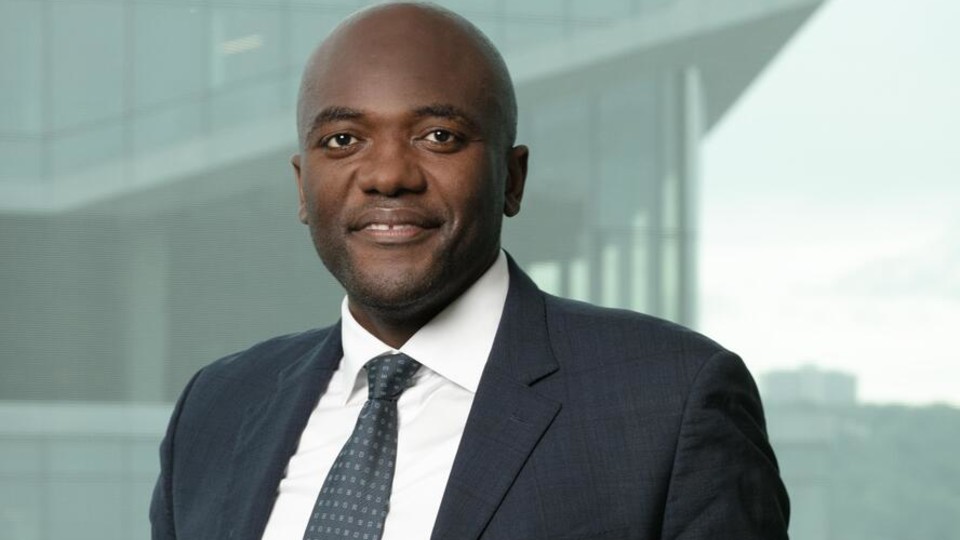
Owl Have You Know
Season 5, Episode 15
At a time when startups are primarily funded by private market investors, who you know has become a critical factor in gaining access to that venture capital. But how does the reliance on alumni and professional networks create barriers for startups from historically disadvantaged groups?
Emmanuel Yimfor ’20 is a finance professor at Columbia Business School and holds a Ph.D. from Rice University. His research focuses on entrepreneurial finance, diversity and private capital markets, with insights into gender and racial disparities in venture capital funding, board representation and how resources could be more equitably allocated.
Emmanuel joins co-host Maya Pomroy ’22 to discuss his career journey from working at a Cameroonian telecommunications company to teaching at some of the top U.S. business schools, as well as his research on the influence of alumni networks in venture capital funding, how AI tools can address biases in lending, and finally how he’s teaming up with his son to bring AI tools to young innovators and entrepreneurs in Cameroon.
Subscribe to Owl Have You Know on Apple Podcasts, Spotify, YouTube or wherever you find your favorite podcasts.
Episode Transcript
-
[00:00]Maya Pomroy: Welcome to Owl Have You Know, a podcast from Rice Business. This episode is part of our Flight Path series, where guests share their career journeys and stories of the Rice connections that got them where they are.
On today's episode of Owl Have You Know, we catch up with Emmanuel Yimfor, a finance professor at Columbia Business School. We'll explore his path, from earning a Ph.D. at Rice to teaching at some of the top business schools in the country, what drew him to entrepreneurial finance, and the surprising insights from his research on venture capital, alumni networks, and the hidden friction that shapes who gets funded and who doesn't. We'll also discuss the lessons from Rice that still guide him today and some exciting ventures of his own that he's launching to promote equity to all innovators, regardless of geography.
Just a quick note that, halfway through the recording, my Wi-Fi staged a little rebellion and I had to switch to my phone to keep the conversation going. The audio quality might dip just a little bit, but trust me, Emmanuel’s insights are worth sticking around for. Now, let’s dive in.
Go, Owls, even though you're in New York. Welcome to the program.
[01:15]Emmanuel Yimfor: Well, thank you so much for having me, Maya. It's an honor to, you know, be doing this.
[01:19]Maya Pomroy: So, your research and expertise centers on entrepreneurial finance, diversity, and private capital markets. And specifically, your area of focus is examining gender and racial gaps and VC funding, board representation, and private equity fundraising. What was it about this specific topic that drew you to it?
[01:45]Emmanuel Yimfor: Absolutely. That's a great question. So, if I could zoom out a little bit, my research is really about how private markets function and who gets access to funding. Private markets have produced some of the most spectacular companies that have done things that have completely changed our lives. And so, my research is trying to understand, could they do even better, right?
[02:06]Maya Pomroy: Right.
[02:06]Emmanuel Yimfor: And so, I was really struck, first of all, by how little research was being done on private markets when I was, like, doing a Ph.D. program and hearing so much about public markets. And I was really driven to understand more about this opaque section of the market that, you know, was just not being studied because of a lack of available data.
And so, one of the things that I was able to do was, like, create a lot of data sets that allowed us to study the distribution of private markets funding. So, if you start off from a base and that base assumption is, you know, talent is evenly distributed in the population, irrespective of what gender or what race you are, then it follows that, when you look at the distribution of people getting capital in private markets, and that distribution differs substantially from the base distribution of talent that you would expect, it naturally gives rise to thinking more about whether this capital is being allocated in the most efficient way possible.
And so, that's what naturally gave rise to trying to understand how private markets funding is distributed by race, by gender, and how the highest levels of corporate governance, which is the board, whether that reflects the racial and gender representation that we see in the economy, at the base of all of this is a very basic tenet of finance, which is we want capital to be allocated to its most productive uses.
[03:30]Maya Pomroy: Efficiency.
[03:31]Emmanuel Yimfor: Efficiency, exactly. And so, the first step is understanding how capital is being allocated. Really nothing controversial there. And then the second step is understanding, given the distribution that we see, what are some potential reasons that might lead to an allocation that we would not expect, if you start off again with this base assumption that capital is evenly distributed in the population?
[03:55]Maya Pomroy: So, as I was reading some of your research, I started thinking, it's not what you know, it's who you know, right? And so, even in MBA programs, there are significantly more men than there are women, and there are significantly more men in private equity and venture capital. I mean, there just are. That's just a fact. So, as I was thinking about this, I was wondering, is it just based on the distribution of who is in this field and who is in this industry? Or is it something deeper than that?
[04:30]Emmanuel Yimfor: Oh, that's an excellent insight. If you think about, you know, the persistence, like, given that we started off with a base representation of, you know, just using your example, men and women in the private capital space, and then you think about, say, even how deal sourcing works, which is, you know…
[04:48]Maya Pomroy: On the golf course or something like that.
[04:50]Emmanuel Yimfor: Yeah. Network, you know. What kind of opportunities are available? What kind of deals are you seeing? You're asking your investment banker friend, which is how a lot of these private equity deals are sourced. Then, you can easily see how the base representation is very sticky. To be sure, there has been progress over time, but it’s very much what you described, which is, who do you know, right? And so, that base representation can be very sticky and very hard to change, given the nature of private markets.
One piece of data that this reminds me of is, looking at founders that are funded by, say, accelerators, accelerators have a clear application process. So, they have an “Apply here” button on their website where you can click and you could submit your pitch deck, and then you would have an interview.
[05:38]Maya Pomroy: Like the Y Combinator, those sorts of things.
[05:40]Emmanuel Yimfor: Exactly. And then they interview you and just have much higher levels of representation relative to other venture capital funds where there is no clear application process.
And if you think about why that is, it, kind of, makes sense, right? Because, as a founder, you need to network and you need to be aggressive and, like, just be entrepreneurial in terms of, like, getting your business off the ground. And so, it makes sense, actually, to say, “Look, if you are entrepreneurial enough to find me and get access to me as a partner, then maybe you're the kind of person that I want to fund.” That would be great if the network, access to the network, was evenly distributed. What you're doing there is, like, disadvantaging some people who might not have this kind of good access to the network to reach you. And then that would drive this kind of persistence that we see in the representation of the people currently in the industry who drive who get funded.
They fund some really good ideas, but it always begs the question, could we be doing even better with how private market capital is allocated, if we were to think a little bit more closely about who might be disadvantaged by this very network-based business, right? So, one of the barriers to, you know, just having the industry agreeing to, “Let's just have an ‘Apply here’ button for everyone to make sure everyone can have access to us and we can evaluate everyone on the level playing field,” ideas like that.
[07:07]Maya Pomroy: So, that would be a whole lot of people. How do you evaluate that, then?
[07:11]Emmanuel Yimfor: Oh, that is where, essentially, the challenge comes in. The good news is that we have a lot of automated tools that can help you these days with the rise of artificial intelligence.
[07:20]Maya Pomroy: AI?
[07:21]Emmanuel Yimfor: Exactly. That can help you weed through a lot of applications to pick up. So, for example, if you're a biotech fund and that's what you told your limited partners you are going to be investing in, chances are you're not going to invest in a B2B business that's located in a state where you've never done business. And so, you can imagine that a lot of software can help you trim around the edges like that and then allow you a much wider funnel of potential deals to evaluate, especially for the types of founders that you don't think would be able to get to you as easily, just based on their network.
[07:55]Maya Pomroy: Sort of, like applying to, I don't know, Columbia Business School where you can sift through those applications faster.
[08:02]Emmanuel Yimfor: That's a perfect analogy, you know. Like, schools have done it right? Like, they let everybody apply and define, like, just the right criteria to be able to sift through the applications, conduct follow-on interviews, and then let in an entering… very talented entering class, if I might say, in a little bit of self-promotion for Columbia.
[08:20]Maya Pomroy: Yeah, a little bit. No, but we're going to get to Rice, too, because we're going to be… I want to talk to you about Rice as well.
[08:26]Emmanuel Yimfor: Absolutely, yeah.
[08:27]Maya Pomroy: So, you know, you've got quite a phenomenal academic background. And when you were growing up, did you always want to be in finance? Or, was it something that was in your family? Or, what drew you to it?
[08:41]Emmanuel Yimfor: That's an excellent question. I'm not sure the answer is going to be very inspiring, but it's the truth. A series of very fortuitous circumstances. A series of just pure random luck. So, what happened was, I had graduated, the youth unemployment rate in Cameroon is very high, but I got a job with a mobile telecommunications network, like the AT&T of Cameroon. You know, I was comfortable, you know, ready to get married, a 21-year-old, ready to take on the world. And my mom was like, you know, “This cannot be the extent of your dreams.”
[09:13]Maya Pomroy: Smart mom.
[09:14]Emmanuel Yimfor: You have to dream a little bit bigger. And so, I said, “Sure. What do you want me to do?” She's like, “You figure it out, but just try to explore the world more.” And so, I go on the internet, I kid you not, “Universities, America, Canada.” Guess what pops up? I don't know how good their search engine optimization was at the time, but Kent State University and then, Virginia University, something, something, you know. But those are the two schools I applied to because they were the first two, and the internet was really slow. And so, I applied there, got into both of them, and then ended up going to Kent State University.
[09:49]Maya Pomroy: Did you get married?
[09:51]Emmanuel Yimfor: I did not. I did not. You know, she didn't have quite the same dreams as my mom. And so, she stayed back home and moved on.
[09:59]Maya Pomroy: In Cameroon, yeah.
[10:00]Emmanuel Yimfor: In Cameroon. So, I got here, Kent State University. And again, the Ph.D. thing was not even on my radar. My professors…
[10:07]Maya Pomroy: So, that was the first time in the U.S., or had you traveled here before?
[10:09]Emmanuel Yimfor: Yep, first time after undergrad, first time in the U.S., went to a master's program at Kent State University. It was an MBA.
[10:18]Maya Pomroy: Was that a culture shock for you? A little bit?
[10:21]Emmanuel Yimfor: Oh, my goodness. Please, don't even get me started. So, what is my best story? There are too many, but one of the best ones is that it was snowing outside and I did not have gloves to put on. And so, I thought, you know, it's just a short one-mile walk. Not one kilometer. One mile.
[10:40]Maya Pomroy: A mile, that's longer.
[10:42]Emmanuel Yimfor: Yeah, that’s longer. And so, I got back and my hands were so frostbitten. Like, I called my mom to say, like, “If this is what you expected me to achieve here, mission accomplished, because this is terrible,” you know. And, of course, that was easy to fix because she listened to me until I got to the end of my story, and she's like, you know, “You should probably buy gloves.”
[11:07]Maya Pomroy: Buy some gloves.
[11:09]Emmanuel Yimfor: Buy gloves. So, a huge culture shock, just to be honest. And then, at Kent State, if I can be so shameless as to, like, call them out, Michael Ellis, Emmanuel Dechenaux, those two people kept suggesting a Ph.D. program to me. Like, you know, “You should really think about doing a Ph.D. program.” The dream was to do a Ph.D. program in macroeconomics at the University of Minnesota.
[11:32]Maya Pomroy: Even colder.
[11:33]Emmanuel Yimfor: Yes, even colder. But back then, I had gotten more used to the weather. And so, through their nudges, I got admission to go to the University of Minnesota to do macroeconomics. But then, that's the key twist. I had a friend from grad school from Bangladesh who kept saying, like, you know, “The way you explain things and the way you relate to people, you don't sound like a typical economist in an econ department. You should probably think about a business school because I can understand what you're saying.”
[12:04]Maya Pomroy: Yeah, you're not talking in statistical regressions.
[12:07]Emmanuel Yimfor: Yeah, exactly. And so, I was like, “I have a very limited application budget.” He's like, “Sure. Why don't we find three or four schools where the likelihood that it would admit you is very high?” And so, I kid you not, we went from website to website. I don't know if I can say this, but again, I said I'm going to be blunt, looking for whether there was anybody that looked like me on the website. And so, the goal was that, if there was somebody who looked like me, then the chances that I would be admitted would be high, because in his words, I was the smartest person who looked like me that he knew.
So, that's what happened. And so, at Rice, they had admitted another Ph.D. student from Cameroon, Alberto [unintelligible 12:47], at the University of British Columbia. So, that's what led me to apply to Rice, believe it or not.
[12:53]Maya Pomroy: So, can you tell me about your time at Rice and its culture and the support that you've been given from Rice Business? You received your Ph.D. five years ago, so you've had some time to reflect on that experience. And good gracious, you got that Ph.D. right around the time that COVID started, right?
[13:13]Emmanuel Yimfor: Yeah. I've always had this, you know, little bit of regret that I wasn't able to, like, wear my robe and walk like everybody else. I was very much looking forward to the Ph.D. But back to Rice, Rice was… the short answer is just incredible, right? Like, I still remember, they had this open-door policy, a lot of the professors there, where you could just have an idea and walk into a professor's office whenever. So, you do not need to, like, make an appointment with them. If the door was open, they made it.
[13:43]Maya Pomroy: So, walk on in.
[13:44]Emmanuel Yimfor: Knock and walk on in. And I just pitched them so many ideas over the years, you know. I had a portfolio approach to advice, so I would pitch Maya an idea and then I would take whatever feedback she had, and then I would spend maybe 10…
[13:58]Maya Pomroy: You tweak it.
[13:59]Emmanuel Yimfor: Refining it, and then I'll go to the next professor-
[14:03]Maya Pomroy: That's brilliant.
[14:04]Emmanuel Yimfor: … and pitch them a refined version, and then they would have one or two suggestions for me. And then I'll tweak it in 20 minutes, and then I'll go to the next one. And so, by the time I pick this with four or five people during the day, the idea that I started off with looked very different. And I don't think that would've been really possible at other places because, like, you know, other places do a good job supporting their Ph.D. students but they don't quite have that, like, same open door policy that Rice had. And the faculty made a really intentional decision to have this open door policy to support their students. And I think that benefited me enormously.
The dedication, James Weston, Alex Butler, Alan Crane, their dedication just to supporting the Ph.D. students, Alex Butler reading the papers over and over again and providing feedback. You know, I still remember all of his bullet points for what makes a good paper, like, what do you do? Why is it important? Why should we believe you? All those things, he just repeated them so often that they stuck even this many years later. Whenever I'm reading a paper for a referee reporter, I'm writing a paper myself, those questions are the first things that pop up. That's just how deep and how high-quality the instruction at Rice was. I just have nothing but praise for my experience there at the Jones School of Business. It's one that, you know, I'm incredibly proud of.
[15:24]Maya Pomroy: The caliber of the folks that are there, I'll agree with you, because, you know, when I was there for my Executive MBA, it was the same — you can go in and see a professor and you can bounce ideas off of them, and they're so accessible. And, you know, a lot of places aren't like that. And Rice really does stand out, where what they really want to do is create this culture and this network. And, you know, dovetailing off of network and alumni networks, that's also something that you study and how alumni networks and those connections, sort of, interplay with funding and VC and everything else.
So, you did do a fascinating study on how those alumni networks and social movements affect who gets funding. Can you talk to me about that specific study that you did?
[16:12]Emmanuel Yimfor: Oh, absolutely. So, again, like, backing up again, my research agenda is really, like, how do private markets function and who gets access to funding? So, we started off with race and gender. It's very easy to imagine another dimension that segments private capital markets, which is, where did you go to school?
And so, the natural anecdote is, like, you know, a lot of people who get venture capital funding are from Stanford or from Harvard. And so, in the spirit of, again, like, repeating this very basic tenant, essentially, the goal of finance research is you want capital to be allocated to its most productive uses. And so, you're constantly trying to understand, how might capital be allocated inefficiently? And so, what do we do to improve that process?
And so, then if you take that overarching framework and you come down to thinking about alumni networks, then a hypothesis is immediately obvious. Number one, to what extent is the allocation of capital in private markets a function of where you went to school? So, we know that it is, but the question is, to what extent? Number two, is this efficient or inefficient? So, just to get to the heart of the empirical question here, if Maya decides to fund Emmanuel, is she funding Emmanuel because she was Emmanuel's classmate and has some extra information about how good of a founder Emmanuel is? Because if that's the case, then we would expect that, on average, he’s going to be putting the money towards good use. So, Emmanuel is going to do well as a startup founder funded by Maya.
[17:43]Maya Pomroy: And also, Maya knows where Emmanuel lives, so he better.
[17:48]Emmanuel Yimfor: Yeah, absolutely. You know, on the other hand, though, if Maya is having a conversation with Emmanuel about his startup and the whole conversation is about the good old days of Rice and, you know, sports at Rice and not really about the startup and she ends up investing in Emmanuel just because she feels this natural affinity towards him, that's, like, inefficient capital allocation. And so, what you would expect is that, on average, those deals are going to perform worse.
And so, like, it's not clear which way it goes without really, like, assembling a large data set to really study this question. And so, what we do is, like, a very comprehensive data effort. We look at two decades of data. We map using, like, LinkedIn profiles and a lot of data — what schools each founder attended, what schools each partner attended, when they attended those schools. And then we track the outcomes of those deals. Did the startups go public? Were they acquired? Did the startups fail?
And so, we have this, like, the base headline finding is, number one, one in three deals in the venture capital market are between a founder and a partner who attended the same school.
[18:57]Maya Pomroy: One in three.
[18:58]Emmanuel Yimfor: One in three, that is much larger than anything I was expecting. Again, like anything I was expecting. Let me come back to this thing about expectations. What are my expectations built off of? How do VCs get compensated? They get compensated based on how well their fund performs. They get a 20% tariff. And so, if they make $100, they get 20. Those are high-powered incentives to do the right thing, to be as efficient as possible with the capital you are allocating so that you can take home as large of a paycheck as possible.
So, contrast that to, say, a mutual fund manager, for example, that, you know, makes small money. The larger the amount of money they manage is, it's just very different. And so, VC is not a space where you would think there will be much room for this. But again, back to the nature of the way deals are sourced. If you're sourcing a deal or you don't have an “Apply here” button on your website, then, of course, you're going to get a lot of founders that are, kind of, in your network. But who's in your network? People that you went to school with.
And so, then, that leads us to the second main finding, which is, to my surprise, these investments, on average, are not based on affinity. On average, these investments perform well, which is very consistent with there being some kind of information benefits between founders and partners that attended the same alma mater.
[20:21]Maya Pomroy: Yeah. So, that's also something that, you know… because Rice is also known as the number one entrepreneurial school in the country. And I think a lot of it does have to do with the network and the access to, you know, like the Lilie Lab and everything like that, where you can go and you can meet people face-to-face and they can give you, not just a pitch deck, because, you know, if you don't know them, then they send you a pitch deck and they give you a data room link and you go in and you're, like, sifting through all this stuff and you're like, I don't know. But if it's somebody that you know at Lilie Lab that's like, “Hey.” I'll give an example of someone that I recently met that just launched this phenomenal shoe line, and he's a runner like you. And we'll talk about that, too, because I know that you're a runner and I'm a runner as well, and you just ran a marathon. But just being able to talk to him and feeling the product and I was like, you know, “Can I try this on?” And I had put it on my foot and I was like, “How are these different from, like, Hoka’s or, you know, Adidas or whatever.” And so, that sort of intimacy, so to speak, is something that, you know, when you know somebody and you see their excitement in person, and you can look at all the analytics, there’s stuff you can't measure, right?
[21:30]Emmanuel Yimfor: Exactly.
[21:30]Maya Pomroy: It's that secret sauce that you just can't measure.
[21:34]Emmanuel Yimfor: Secret sauce that makes it hard. To me, this is why, like, you know, empirical work is so exciting to me, because then you're like a little bit of a police detective. So, you take a little bit of this, like, thing that feels hard to measure, and then you can create a hypothesis to link it to, like, the eventual outcomes, to the extent that that thing that's hard to measure is something that's leading to more efficient capital allocation. Then, on average, you know, this feeling that you get about founders that are from the same alma mater should lead to good things, as opposed to leading to bad things. And so, you know, that's exactly the right spirit of how to think about the work.
[22:07]Maya Pomroy: And so, one of your studies, if we're going to talk about, you know, the hard data, shows how algorithms that predict race can actually distort the picture when it comes to fairness in lending. I'm really curious about that, you know, algorithm that you studied. Can you talk to me about that one?
[22:24]Emmanuel Yimfor: 100%. Again, backing up to, how do private markets function and who gets access to capital. When I was embarking on this and I wanted to look at the dimension of race, to what extent are there racial disparities in who's getting access to funding, and how do the deals that minority founders, you know, the startups that are created by minority founders that raise funding, how do the startups perform? One immediate friction that I ran into is that there wasn't a database that reports what the race of founders were.
And so, of course, I turned the literature to read what has been done before. And I noticed that the primary way that they're measuring race, and even this is something that the government used as a way to measure race, was that they would use the likelihood that you're black or Hispanic based on your last name or they would use your geography. And so, I thought, “That seems odd, right? I'm an assistant professor of finance, and so I’m fortunate enough to live in a pretty good zip code. I think my zip code is majority white. The name Yimfor, I'm not sure to what extent I would associate that with a black founder. Let me try it.” So, I went and I put my name in the algorithms. It gave me almost an 80% probability of being white. And I was like…
[23:42]Maya Pomroy: Of being white based on your zip code?
[23:44]Emmanuel Yimfor: Based on my name and my zip code.
[23:46]Maya Pomroy: Your name and your zip code, wow.
[23:47]Emmanuel Yimfor: And I was like, “This is, kind of, odd.” And, like, this is something that's used for… so, like, the regulators, when they're trying to think about which lenders are not lending fairly to certain groups, part of the way they would evaluate this, too, is by using the lenders portfolio and using this algorithm to infer race, especially for small business lending.
And so, I thought, “You know what? Let's think about this a little bit more carefully.” And so, what I did was I used publicly available images of lots and lots of founders, from, like, you know, the paycheck, the PPP program because the data was made widely available. So, I collected a lot of images and then developed an algorithm that takes in the image and the name to predict race.
And so, I was able to validate this. I'm going to spare you a lot of the details, but I was able to validate that this works as a measure of perceived race. Let me tell you a little bit about perceived race. So, the perceived race is, how do other people see you as opposed to what you identify as? So, there was an existing data set that said, “What is your race?” And then people reported their race. And then they asked a lot of people, “Given this person's picture, what do you perceive their race to be?” And so, then we could take those same pictures, plug it into our algorithm, get a measure of race, and show that our measure is much closer to how other people see, right?
And so, with that, we're able to say, “Okay, where does this algorithm of using names and location, where does it fall short? Where do we see this error rate being high?” So, when I say error, you have to have some measure of ground truth. And then, based on the ground truth, you can apply the government algorithm that uses this, you know, last name and zip codes. And then you can look at the two. Where did they differ? That's specifically what I mean by error.
And so, what we showed was that, look, the errors are especially high, so, error meaning the algorithm predicts that you are white when you are not, when you are in fact black, the errors are much larger, especially for black borrowers that live in affluent zip codes. And you would imagine that these are especially the types of black borrowers with higher credit scores, but they don't get this regulatory advantage because the regulators are trying to look at the proportion of black borrowers that you are lending to. But the regulation is going to miss the classification of black borrowers, especially when they live in high-income neighborhoods.
And so, there's an interesting tension in that, if a lender is lending to a black borrower living in a high-income neighborhood, the lender doesn't get any regulatory credit for doing that. And so, what we find is this, like, real tension, which is number one, we can quantify how large the errors are, again, errors meaning the difference between how we're predicting race, which is again using images, and how the regulators are predicting race, which is using last names and geography. So, if you believe that our measure is closer to the truth, and that's something that we show in the paper, then we want to understand what the implications are of using our measure as opposed to using the measure that the regulators currently use.
And so, we find this interesting tension. Number one, if you use our measure, you're going to increase lending to more black borrowers, to be specific, especially to these higher-income black borrowers whose zip code is causing you to misclassify them. But then it's not just good. There's also a little bit of this tension, which is, you would increase lending towards more black borrowers, but you would also increase inequality.
So, it takes a little bit to think about it, but think about it in the sense that, in the current regulations, you get regulatory credit for lending to lower-income black borrowers, right? And so, if you were to use, say, self-identified race or our measure of race, sure, that's going to lead you to make fewer of these errors, which misclassify higher income black borrowers as non-black. But then, at the same time, they will get a lot more of the loans because, you know, the higher the income, then the likelihood of repayment is much higher, which would increase within group inequality. So, within black borrowers, the inequality is going to increase.
And so, that's what that paper was about. That paper was not just about, like, you know, thinking about the regulatory pitfalls of using this imputed measure of race. But it was also, kind of, a foundational paper for a lot of what I've done in the papers that I've written, which is, like, look, at the foundation of trying to understand how private markets function and who's getting access to capital, you have to be able to measure things correctly to even have a conversation, right, you know.
And so, if you can't measure things correctly, then you’re, you know, kind of, talking in the air without anything concrete. And so, this paper was, kind of, a foundational paper to really anchor, “Here's what I think is better measurement, and here's how other measures fall short. Now that we have anchored and discussed this better measurement in this setting, let's move forward with thinking about other settings and why we have the allocation of capital that we do, having taken care of the measurement issue,” if that makes any sense.
[29:02]Maya Pomroy: So, you got the hard data to prove all of this. How do you get people to change their behavior?
[29:09]Emmanuel Yimfor: Right, you know, that is a good question. It's hard. So, I have a belief in America, at least based on my life journey, which is, if you work hard for long enough, somebody is going to recognize you and you will be rewarded for it. And so, I really believe that, America takes in data, thinks about that data for a while to think about whether the research is credible enough. And then using that data, they act in a new way that's consistent with what the new before and the new data.
And so, I think about my role as a researcher is just, like, you know, providing that data. Here's the data and here's what is consistent with what we're doing right now. Now, you know. What you do with that information now is, like, you know, update what you're doing in a way that's, like, most consistent with efficient capital allocation, is my hope. And so, like, the best way that I can, kind of, influence how this fits is by writing good papers and making cogent and logical arguments that are not impossible to understand and getting the research peer-reviewed and published.
[30:17]Maya Pomroy: Right. I think awareness is the most important part, is that, if people are aware of, you know, whether it's innate or not innate bias, that's the only way that you can make meaningful change, is to bring it to light so that people see what's happening, you know. And a lot of people don't like to talk about it, right? Like, we're in a time right now where nobody really wants to talk about it and put it on the back burner. But it is happening and there's data and evidence to prove that it is. So, instead of looking the other way, why don't we become better and stronger and more efficient and more productive and continue being, you know, the country that's the leader in innovation?
[30:56]Emmanuel Yimfor: Absolutely. Some of the insights from the research are very non-controversial, right? This issue, for example, like, minorities and women have less access to good networks. And having less access to, just to be specific, what does good networks mean exactly? If you look at venture capital partners, for example, right? They have worked at McKinsey before they became venture capital partners. So, they have worked at certain companies, they've done certain jobs that then led them to become VCs. And so, to the extent that we have a lack of representation in this pipeline of jobs that's leading to VC, then the founders that don't come from these same backgrounds do not have as equal access to the partners.
And so, what that suggests is something very basic, which is, like, just rethink the set of deals that you are considering because that might expand the pool of deals that you consider, because, you know, there might be a smart person out there that's maybe not the same race as you but that has an idea that you really, really want to fund. And that's something that I think, like, everybody would agree with, you know. We want to allocate capital to these most productive uses. And so, to the extent that, people picking up a paper like this would expect the conclusion to be already written. I would encourage them to read further. They will be surprised by some of the findings that suggest some really low-hanging fruit to improve the efficiency of capital allocation.
[32:21]Maya Pomroy: Which is what everybody wants in order to thrive and evolve and become a stronger society.
[32:27]Emmanuel Yimfor: Absolutely, yeah.
[32:28]Maya Pomroy: So, I know that you're a runner and that you recently ran a marathon. I love to run as well, and I feel like some of my best ideas are when I'm running. Is that your time to think about what you're going to do next or what you want to study? That's the only time that I can really think clearly.
[32:45]Emmanuel Yimfor: It’s very much the same as you. So, I did this all through my Ph.D. There are people who recognized me and said, “Aren't you that guy who was always running at the Rice campus?” I did that every year I was there. I would go around twice and then take a shower at the gym, and then go right back to work. And so, it's really my secret time. Every day, I have been pushing myself more and more to run longer distances. Hopefully, many more marathons to come. But it's like it's something that I've done for many, many years. And let me knock on wood. Many more years to come. It's a time to think. It's a time to reset the day. It's a time to put things into perspective. I really just check in with myself.
[33:26]Maya Pomroy: Yeah, so I hear that you've got a really interesting project coming up in Cameroon where you are going to connect folks with AI tools. Can you tell me what you're planning on doing and when you're going, and so we can ask you all sorts of questions next time when you come back?
[33:42]Emmanuel Yimfor: Yeah, no, absolutely. So, this is actually an initiative of my son, you know. You asked me about how I got into the Ph.D. at Rice. So, buried in there was just the role that open source resources have played in my life, right? Being able to access free education material from MIT OpenCourseWare, for example, on YouTube many years back, or, you know, even being able to access even Khan Academy videos many years back when I first came to the U.S. Remember, I couldn't really use these resources as much in Cameroon because the kind of internet connection I had access to just wouldn't allow me to load a whole 20-minute video.
And so, with the advent of artificial intelligence and all the productivity gains and how it's changing people's lives here, I kept telling my son about this. And he was like, “You know, it would be interesting to give 16-year-old you the kinds of opportunities that kids here have.” And I was brainstorming with him, thinking more about how we would exactly do that. And that, kind of, morphed, you know. And he started talking to his co-founder, too, which is Paul. They're both at Bronx Science High School.
And that morphed into the current idea, which is very simple at its heart — the fact that internet connection is not very stable in Cameroon and the fact that a lot of people connect to the internet using their mobile phones means that they can experience AI in this way that doesn't fully harness this productivity. So, they use it to edit messages on their phone or they use it to generate nice, cool pictures.
What we're going to do is we're going to take five local large language models and put them on, like, you know, heavy-duty computers. I'm talking about these gaming computers that have six or more gigabytes of VRAM that can load these models into memory. It does not require the internet. We're going to set up a learning center where kids cannot come in with their phones. No distractions. Just focus on doing your homework using these artificial intelligence models that are going to be installed locally on the computers.
And so, if you think about something like, you know, a gaming laptop that's, like, $1,000 to $1,500. For the average American, that's something that's affordable. But for a kid down there, that's a major capital investment. It's almost like a car in the U.S. where we have financing alternatives for cars. But down there, those don't really exist. And so, this could really fill a critical gap, not just in training kids to have the kind of skills they need to survive the future and showing them the full power of artificial intelligence, but in the limit. Once we have established enough of these centers, I could easily imagine a scenario where, even adults, working professionals that don't have access to the same kind of equipment, can come in there, get some work done. Of course, for the center to be sustainable, we might charge them some type of fee, and then use that to subsidize the kids that are coming in there to do their homeworks and learn, you know, coding with all the latest local large language models and just build some kind of a sustainable solution that allows the people down there to harness the latest cutting-edge technology to solve problems that are local to their community. Giving people the tools they need to empower themselves, I think it's at the very heart of being able to give them a bright future.
So, that's what the project is. We're starting small. We're currently fundraising. We're going to run a training program where we're going to tell them about the models, tell them about what AI can do beyond just using their phones, allow them to do a project, and give them a certificate that's going to give them lifetime access to the center. And then, you know, we're just hoping to build things from there. But that's the project in a nutshell.
[37:17]Maya Pomroy: Now thinking, you know, giving this opportunity and equitable access to the kids in Cameroon, you know, those might be the same ones that might be, you know, applying for those funds for their venture capital idea. So, it's, sort of, full circle, isn't it?
[37:32]Emmanuel Yimfor: Absolutely, very full circle. We're hoping, like, we produce many, many founders out of these centers that can harness this power of artificial intelligence, again, to solve local problems. There's so many small entrepreneurs in Cameroon where, you know, not just Cameroon but other parts of Africa.
[37:51]Maya Pomroy: All over the world, yeah.
[37:52]Emmanuel Yimfor: All over the world. And so, we're really hoping that, you know, like, Cameroon is just the start. We're hoping to go to as many places as possible where there's this potential gap in the amount of capital investment that's needed to, A, have access to high-quality internet so you can harness the powers of these models, and B, have access to, say, high-quality computing, where you can host large enough data sets that you can analyze for insights to, again, you know, back to coming back full circle, better allocate the resources that you have to their most productive uses.
To me, that's, like, what always excites me about finance. I have a dollar of consumption today. I want to consume that in the future. How do I allocate that dollar in the way that generates me the most consumption in the future? And we're hoping that these centers that we're setting up can be that multiplier that turns that dollar into many more.
[38:47]Maya Pomroy: I love it. I'm sure it will be a phenomenal success. And I just also wanted to ask you if you have any final thoughts for folks that want to get into this space or, you know, what you hope the future holds for founders and for the markets and efficiency, really, for our world.
[39:06]Emmanuel Yimfor: Oh, no, absolutely. So, like everybody else, I'm looking forward to seeing how artificial intelligence changes the funding landscape. I think my prediction is that it should help, you know, founders have some kind of, like, you know, working minimum viable product a lot faster.
[39:23]Maya Pomroy: MVP, the MVP.
[39:25]Emmanuel Yimfor: Yeah, it's that MVP that they can put in front of investors, even when, you know, like, we're just discussing these frictions where you're not able to access, say, a venture capital partner because you're not part of their network. If, in addition to the application and the business idea, you can also have an MVP that they can quickly look at, you would expect that these types of things would reduce the importance of things like, you know, “Are you from my network? And does that determine whether I fund you?” Because then the MVP is another piece of information that might, you know, lead to capital being more efficiently allocated.
And so, I'm very much looking forward to seeing how the funding landscape changes, to what extent do the kinds of frictions that I’ve studied — so, like, the networking friction in particular — to what extent does that become more or less important, as we move forward with this new information that founders might be able to generate by leveraging AI to other people who are thinking about, maybe, a career in academia. It's really a place for the curious. If you're curious about explaining how the world works and improving how the world works and you want to think for a living, I cannot think of a better career path to encourage you to take on.
[40:36]Maya Pomroy: Well, yeah, curiosity. Never lose your curiosity.
[40:39]Emmanuel Yimfor: Exactly. Stay curious. Stay hungry.
[40:42]Maya Pomroy: Well, it's been a pleasure, Emmanuel. Thank you so much for joining us. And we look forward to learning more about how you expand all these opportunities to those folks that, you know, could literally change the trajectory of our world.
[40:56]Emmanuel Yimfor: Thank you so much for having me, Maya. It's been my pleasure.
[41:00]Maya Pomroy: Thanks for listening. This has been Owl Have You Know, a production of Rice Business. You can find more information about our guests, hosts, and announcements on our website, business.rice.edu.
Please, subscribe and leave a rating wherever you find your favorite podcasts. We'd love to hear what you think.
The hosts of Owl Have You Know are myself, Maya Pomroy, and Brian Jackson.
You May Also Like
Why a Landmark Settlement on Realtor Fees Hasn’t Cut Costs
A study by Rice Business professors Jefferson Duarte and David Zhang found a small increase after the settlement went into effect in the share of buyers who chose not to use real-estate agents in certain states.

